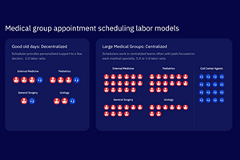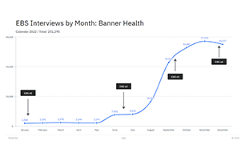
The Latest Hospital Digital Marketing Articles
GreyMatters is your hospital digital marketing guide, with articles on hospital digital marketing best practices, trends, updates and more.
Using AI to Optimize Patient Access
This article was written by Matthew Hanis, Head of Strategy at MedChat.
Optimizing patient access is one of the thorniest challenges in healthcare. 
An appointment is a terrible thing to waste. Providers are scarce and expensive, which means the same for clinic appointments. Leaving a slot unfilled or wasting a slot with an inappropriate appointment is costly.
The sheer volume of appointment scheduling phone calls has led to centralized scheduling for primary care, specialists, imaging, lab testing, and other appointment types. Centralizing doubles agent labor productivity and helps with training, compliance, performance improvement, and so forth.
For practices with 50 or more providers, centralized scheduling is almost inevitable. Today’s mega-groups with thousands and thousands of providers could not exist without various forms of centralized scheduling.
Centralized Scheduling Reduces Personalization
Patients want personalized convenience and efficient provider appointment scheduling. Patients want appointments as soon as possible but have no visibility to the other patients with higher urgency who should be seen first.
Providers want appointments which are a good use of their time and for which they can appropriately bill for care. Sometimes patients get scheduled for appointments which were inappropriate, creating patient frustration and provider opportunity costs of a wasted office visit. Sometimes an appointment gets booked too urgently, blocking that slot for another patient with much greater urgency.
Agents, humans-in-the-loop, mitigate these problems by understanding scheduling algorithms and detecting exceptions. They also translate between the patient and the tech used to manage provider appointments. Agents are needed because handling all the variation while getting the right patient to the right provider at the right urgency is really hard.
Fifty years ago, most patients spoke with someone they knew when scheduling an appointment for themselves or their kids. Those phone calls were often with the receptionist they met at the start of a prior clinic visit. That receptionist was part of an intimate care team built around a provider’s needs and practice style. To most providers, those were the ‘good old days’.
Today, an agent rarely speaks with the same patient and their scheduling workflow is hard to adapt to changing provider needs. No matter how hard an organization tries, centralized scheduling depersonalizes the experience for patient and provider.
Obscured beneath the surface of this depersonalization is the frequency of inappropriate appointments. That receptionist 50 years ago could easily engage the provider or nurse to give guidance and make the best scheduling decision. Today, that is not as fluid and dynamic.
With recent health tech innovations including automation and AI, we can now augment agents to make the best scheduling decisions and provide a way for providers to easily modify scheduling protocols. By doing so, we can re-personalize scheduling and optimize access.
Applying Evidence-Based Scheduling to Improve Access
Evidence-based scheduling is an emerging way to optimize patient access. EBS uses AI, data integrations, embedded workflow, and automation to augment agents when scheduling appointments with patients by phone.
Artificial intelligence is used to determine, out of all the permutations of care which could be scheduled, what is the right type of care at the right urgency. These AIs solve problems in real-time using basic natural language processing to help determine intent and specialized large language models to determine the most likely diagnoses and clinical urgency.
All of this operates within a broader automation workflow which can easily be modified. The same tech can be deployed for consumer-facing self-service experience on the provider’s public website and/or patient.
Using Evidence-Based Scheduling at Banner Health
Banner Health deployed EBS using MedChat with built-in AI algorithms from Isabel Healthcare.
The deployment supports 400+ medical group scheduling agents using EBS in about 60K patient scheduling calls per month.
When a patient (or caregiver) calls to schedule an appointment, the agent accesses MedChat as part of their scheduling desktop. They enter all of the information into MedChat while speaking with the patient. MedChat then returns care recommendations in prioritized order. The agent works with the patient to select the care best for them, the appointment is scheduled, and the transaction completed.

Banner Health uses evidence-based scheduling to augment agents as they speak to patients by phone, entering the needs, symptoms, and other information into the AI built to support them.